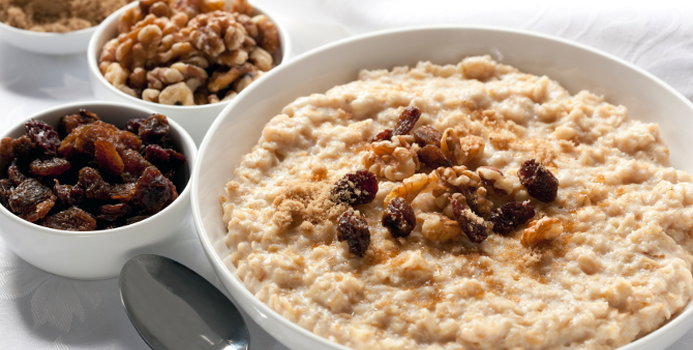Oatmeal has long been one of the widely used breakfast cereals. It is an excellent low calorie meal. One cup provides about 150 calories. It is a highly regarded cereal for its rich mineral content. Oats contain high levels of calcium, phosphorous, potassium and magnesium. They also contain iron, manganese and zinc as well as other trace minerals. The cereal is also very rich in dietary fiber. Oatmeal has various health benefits.
Lowers Cholesterol Levels
Oats are highly recommended for those with diabetes or heart disease. The food contains beta-glucans, a special fiber that helps to lower blood cholesterol levels. The fiber breaks down while in transit in the digestive tract. It forms a gel that captures some of the substances that lead to cholesterol formation. This reduces the amount of cholesterol formed in the bloodstream. Studies have shown that 3 grams of oat fiber, typically contained in a bowl of the cereal, can lower cholesterol by 10 to 25 percent. Oats are also a rich source of vitamin E. It contains tocotrienols which hinder the formation of cholesterol. This helps to lower blood cholesterol.
Improves Cardiovascular Health
Oats contain antioxidants which help to protect good cholesterol in the blood. Antioxidants protect good cholesterol from the harmful effects of free radicals. Oats also help to lower blood cholesterol levels. This helps to prevent plaque build-up in the arteries and also prevents blood clots. It promotes better heart health. Oats help to stabilize blood pressure and prevent hypertension. This reduces the risk factor for stroke and coronary disease.
Stabilizes Blood Sugar
Oats contain high amounts of both soluble and insoluble fiber. Soluble fiber reduces the rate of starch digestion. This helps to prevent sharp rises in blood sugar that result from meal ingestion, and helps to spread blood sugar increases over a longer duration. Oatmeal can help diabetics to manage their blood sugar and insulin levels. This helps to prevent diabetes-related complications.
Weight Control
Once consumed, the soluble fiber in oats makes you feel full for a longer period of time. It forms a gel which increases the viscosity of contents in the stomach and small intestine. The gel prolongs the time taken for the stomach to empty itself. The cereal also helps to stabilize blood sugar. This reduces the need to snack on high sugar, high carbohydrate items in the course of the day. Research has shown that children who regularly consume oatmeal have a lower risk for obesity.
Anti-Cancer
Several phytochemicals in oats help to reduce the risk of prostrate, ovarian and breast cancer. Studies have shown that higher intakes of dietary fiber result in lower levels of estrogen in circulation for women. This reduces the risk for breast cancer. Insoluble fiber also attacks certain carcinogens in the digestive tract and reduces their toxicity. This makes it a helpful agent in the fight against cancer.
Bowel Movements
The high dietary fiber in oats contributes to healthy bowel function. Insoluble fiber helps to make stools heavier. This accelerates their transit through the gut. It helps to eliminate constipation, and prevents piles which are mainly caused by chronic constipation.



